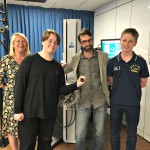Mobile working is on the rise in the UK, with more and more people travelling for work or being away from home for extended periods of time, which has significant implications for work-life balance and family life. Someone working Monday to Friday in in a location away from home might miss out on valuable time spent with a young family, while another worker travelling for long periods may have difficulties finding time to spend with a partner.
In a digital age, how can we solve these problems and maintain family life while on the move? That’s exactly the problem that academics from Bournemouth University, Newcastle University, the University of the West of England and the Royal College of Art set out to tackle with their innovative research project – Family Rituals 2.0.
The interdisciplinary research project stemmed from a ‘Creativity Greenhouse’ session held by the Engineering and Physical Sciences Research Council, where researchers from a multitude of disciplines came together to tackle societally relevant problems from very different angles.
It was this mixture of perspectives and expertise that meant the team working to develop Family Rituals 2.0 have been able to analyse the problem of mobile working from the point of view of employers and employees, as well as develop novel technological solutions to specific issues faced by families who spend a lot of time apart due to work. These designs will be on display as part of the London Design Festival.
Lead researcher for Bournemouth University, Professor Adele Ladkin comments, “It’s been a great experience to work together with researchers in other fields to tackle the problems faced by families as a result of mobile working. We all have very different skills and expertise which has helped us to analyse the issues and then come up with creative solutions.
Here at Bournemouth, we worked with UWE to interview employers about the support available for mobile workers, as well as talking to employees about the consequences for them, their families and partners. Those results, as well as in-depth interviews with a handful of families, were used by Newcastle University and the Royal College of Art to create the designs that will be on show at the London Design Festival.”
The machines designed include a digital solution for a couple to share a drink together while miles apart and a creative means for a parent who drives a lorry for work to hear messages from their children while stationary in traffic.
“Each machine was created for a specific family, according to their situation and domestic life,” explains Professor Ladkin, “While we don’t expect these designs to present a solution to the issue of mobile working and separation, we do hope that it will stimulate discussion about what home and family life mean and what the effects of being separated from it are.”
The exhibition is open to the public from 19 – 24 September, 10am – 5:30pm at the Royal College of Art in London.
More information about the exhibition can be found on the London Design Festival website or by following the #LDF2015 hashtag on Twitter.
 A great opportunity from the collaboration of Bournemouth University and Nuffield Foundation
A great opportunity from the collaboration of Bournemouth University and Nuffield Foundation










 Nursing Research REF Impact in Nepal
Nursing Research REF Impact in Nepal Fourth INRC Symposium: From Clinical Applications to Neuro-Inspired Computation
Fourth INRC Symposium: From Clinical Applications to Neuro-Inspired Computation ESRC Festival of Social Science 2025 – Reflecting back and looking ahead to 2026
ESRC Festival of Social Science 2025 – Reflecting back and looking ahead to 2026 3C Event: Research Culture, Community & Cookies – Tuesday 13 January 10-11am
3C Event: Research Culture, Community & Cookies – Tuesday 13 January 10-11am Dr. Chloe Casey on Sky News
Dr. Chloe Casey on Sky News ECR Funding Open Call: Research Culture & Community Grant – Application Deadline Friday 12 December
ECR Funding Open Call: Research Culture & Community Grant – Application Deadline Friday 12 December MSCA Postdoctoral Fellowships 2025 Call
MSCA Postdoctoral Fellowships 2025 Call ERC Advanced Grant 2025 Webinar
ERC Advanced Grant 2025 Webinar Horizon Europe Work Programme 2025 Published
Horizon Europe Work Programme 2025 Published Update on UKRO services
Update on UKRO services European research project exploring use of ‘virtual twins’ to better manage metabolic associated fatty liver disease
European research project exploring use of ‘virtual twins’ to better manage metabolic associated fatty liver disease